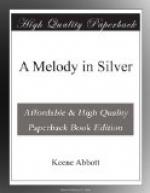“We don’t care to play with Mitch any more, do we, Mother?”
Or again:
“We don’t care nothing about trouvers, do we, Mother?”
Sometimes David would ask with husky heroism:
“Curls is all right for little boys, is they not?”
David was angry with Mitch; David was never going to speak to Mitchell Horrigan any more. His resolution was so strong that he hurried away to tell Mitch about it, but when the boy actually appeared, it was hard to remember why one should be angry with him. His brown feet came flapping along the stone walk, and in his hand was a freshly whittled stick that made an animated clatter when he drew it along the fence. There was that in the reckless abandonment of Mitch which did not help David to tell him that he was too mean and disgraceful to be spoken to. And besides, his feelings might be hurt if one were to tell him that. So, as Mitch came nearer and nearer, David felt guiltier and guiltier, and presently he was surprised to hear himself asking rather abjectly:
“You isn’t mad at me, is you, Mitch?”
Trouvers ignored the humble salutation. He took out his knife and began to whittle ceremoniously upon the stick.
“What you making?” David asked tentatively.
“Nothin’ much,” said Mitch, with the air of a man who has invented steamships and flying machines. “Only a tiger trap.”
David knew better. David knew that Mitch, in his insufferable conceit, was merely whittling to show off his new knife. So, pressing his red mouth between two white palings of the fence, David declared in a strong voice:
“I have a bigger knife than that.”
The assertion was boldly made, but when Mitch asked to see the knife, David decided not to show it.
“Bigness don’t count,” said Mitch. “It’s the steel.”
He breathed upon the blade to test its quality. Every boy knows that if the film of moisture is quick to vanish, there can be no question about the superlative merit of the knife.
“Where did you get it?”
David was eager to know that, but Mitch decided that he must be going. He hadn’t time to stay here any longer. He intimated that he had important business to look after. He was going to make a kite ten feet tall, and, with the snobbishness of a plutocrat, he went strutting away. He was almost beyond earshot when he volunteered this brief information:
“My father, he guv it to me.”
Had David heard correctly? Did Mitch say “father”? The little boy had never thought of such an article as a father except as something which belongs to a story book. Fathers were common enough in the story books; they were men, but until this moment David had never thought of them as being desirable. It now appeared that they were good for something. Mitch Horrigan had one. He actually kept a father, and the father gave him fine presents.




